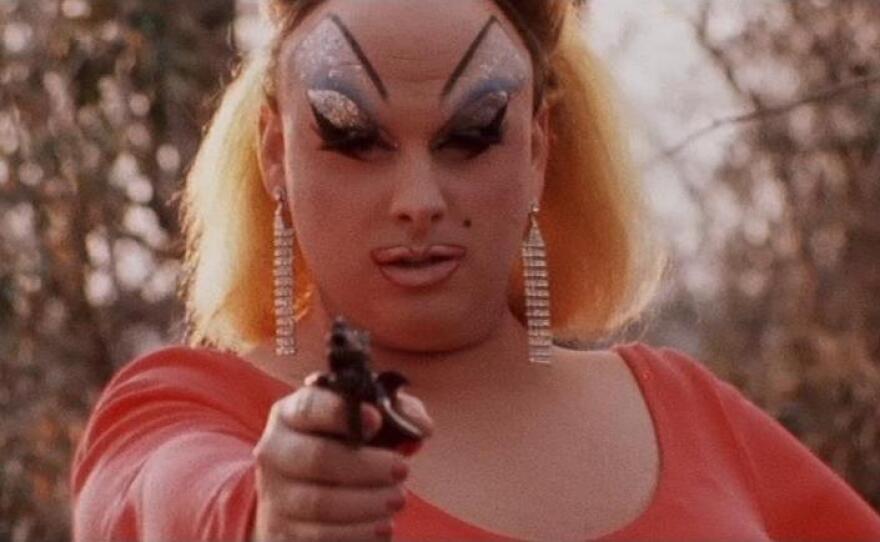FilmOut, San Diego's LGBTQ Film Festival, is screening John Waters’ "Hairspray" this Wednesday as part of its ongoing monthly film series. It is a film still worth celebrating.
Waters has been called The Sultan of Sleaze, The Prince of Puke and The King of Schlock — all titles he wears proudly. He boasts that in regards to his film "Desperate Living," an official censor in London wrote, “We do not know how to deal with the subject of intentional bad taste.” Nothing could have delighted Waters more.
RELATED: Podcast Episode 70: The Trash Cinema Of John Waters
But "Hairspray" in 1988 marked a turning point for the director. It was a film that had broader appeal, and while Waters toned done some of his flamboyant outrageousness he did not sell out his values.
One thing that worked in Waters' favor as he moved from the fringe to the mainstream was that even though his films challenged social decorum with incest, exhibitionism, and singing anuses, his approach to filmmaking relied on a Hollywood formula. He insisted on a straightforward narrative plot, emphasized entertainment over enlightenment, and built a stable of stars that rivaled Hollywood in a most outlandish fashion.
RELATED: John Waters Still Shocking And Fun After All These Years
For "Hairspray," he once again used his beloved hometown of Baltimore for the backdrop. The film is set in 1962 as teenager Tracy Turnblad (Ricki Lake) desperately vies for a spot on the popular teen dance TV program, "The Corny Collins Show." Challenging conventional notions of beauty, she gets on the show and angers the spoiled blond princess Amber von Tussle (Colleen Fitzpatrick). Tracy also stirs waves by pushing for racial integration on the show.
As Tracy's mom, Edna Turnblad, Waters cast Divine, who in the past had played the rebellious daughter in his films but now took on the role of an understanding parent who needs to be won over to her teenager's activism. Divine played both the suburban housewife Edna and the racist TV station manager Arvin Hodgepile. And needless to say was divine in both roles.

Harris Glenn Milstead was the actor who gave the world the gift of Divine, a 300-pound drag queen who was the unmistakable star of Waters’ cinematic universe.
Waters and the outrageously glamorous Divine brought bad taste to the level of art. They reveled in trashy obscenity, which infamously included eating dog poop in "Pink Flamingoes." But the scene that was even more memorable and triumphant was seeing a gleeful and absolutely defiant Divine, decked out in a flamboyant outfit, strutting down a Baltimore street to strains of "The Girl Can’t Help It." That was pure cinematic delight tinged with a wicked sense of anarchy and fun. Waters made that film an all out satiric assault on the middle class values that he and Divine both saw as oppressive and hypocritical.
Waters always displayed a keen eye for social observation and genuine compassion for the social misfit. He honed those skills to perfection in "Hairspray," which marked a mainstream hit for the cult director whose films tended to only play the midnight circuit.
FilmOut is screening the Divine version of "Hairspray," not the 2007 remake starring John Travolta in a fat suit. Waters looks to people unashamed of who they are and proud of not conforming to society’s norms. A handsome Hollywood star who can shed his fat suit at the end of the day does not represent that. But Divine was absolutely an icon of proud defiance.
In writing this review I struggled to figure out what preferred pronoun Milstead might have chosen if such a thing existed decades ago. Milstead in interviews spoke of himself as a male actor who created the female persona of Divine. If he was still alive today maybe he would have chosen to use they/them to convey that. But watching "Hairspray" or any of the movies starring Divine what becomes absolutely clear is that Divine exists in a unique category. Divine simply stands alone as Divine.
Milstead passed away in 1988 just as Divine was finding mainstream success. So I will be celebrating Milstead’s Divine legacy with "Hairspray" this Wednesday at the Hillcrest Cinemas courtesy of FilmOut.
Check out my interviews with John Waters on Cinema Junkie Podcast Episode 70 and talking about his book "Carsick".
-
FilmOut San Diego is screening John Waters' 1977 film "Desperate Living" at 3 p.m. Saturday at the Museum of Photographic Arts. The perfect excuse to dust off a 1997 archive interview.
-
John Waters – the self-proclaimed "Pope of Trash" and "People’s Pervert" – returns to San Diego (Nov. 30 at The Observatory North Park) for the John Waters Christmas Tour 2015.








